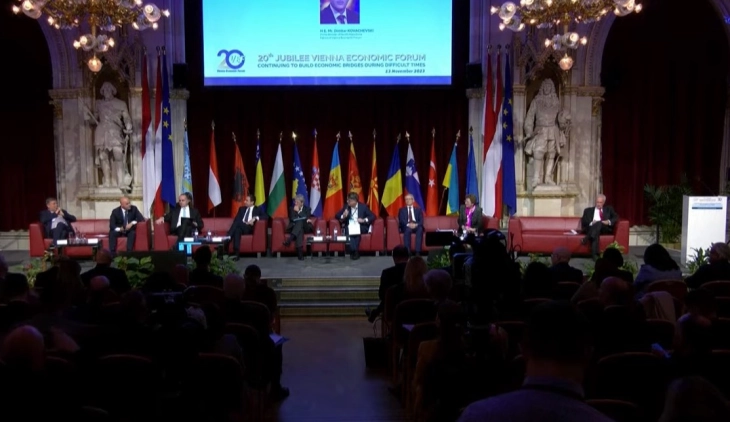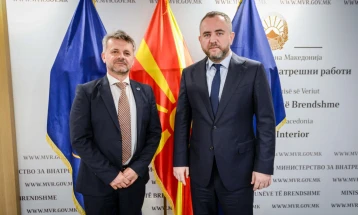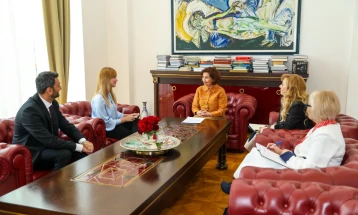Kovachevski: EU integration must happen on political, but also economic level
- After the new geostrategic dynamics in Europe, the key word is integration, not only in the EU, but also in NATO. That is why integration must happen on a political level, but also on an economic level. And that is why we firmly supported and requested the Growth Plan for the Western Balkans from the President of the European Commission, Ursula von der Leyen, as it relies on the benefits of integration, said Prime Minister Dimitar Kovachevski in his address Monday at a panel session on continuing to build economic bridges during difficult times at the 20th Vienna Economic Forum.

Skopje, 13 November 2023 (MIA) – After the new geostrategic dynamics in Europe, the key word is integration, not only in the EU, but also in NATO. That is why integration must happen on a political level, but also on an economic level. And that is why we firmly supported and requested the Growth Plan for the Western Balkans from the President of the European Commission, Ursula von der Leyen, as it relies on the benefits of integration, said Prime Minister Dimitar Kovachevski in his address Monday at a panel session on continuing to build economic bridges during difficult times at the 20th Vienna Economic Forum.
Kovachevski participated in the panel alongside the prime ministers of Albania, Kosovo, and Bulgaria – Edi Rama, Albin Kurti, and Nikolay Denkov, as well as the Minister of Economic Development and Digitalization of Moldova, Dumitru Alaiba.
“One thing is certain. After the new geostrategic dynamics in Europe, the key word is integration, not only in the EU, but also in NATO. That is why probably the two most developed countries in Europe, Sweden and Finland, now want to join NATO. One of them is already a member, while the other is in the ratification process. The same applies to the European Union as well,” said Kovachevski.
The Prime Minister noted that North Macedonia has achieved “many relevant things” in a time of crises during the past two years, especially related to boosting relations with the EU.
“We are building on our NATO membership, in 2016 the direct foreign investments in the country were around EUR 350 million, while during the crisis-struck 2022, the direct foreign investments stood at around EUR 760 million, which is twice as much,” said Kovachevski.

According to the Prime Minister, the importance of the Berlin Process should be emphasized, because, he said, it provides an opportunity to work on legislation, while the Open Balkan initiative, “is proof that upgrading economic cooperation leads to benefits for the citizens”.
“After the initiative, trade with Serbia and Albania has grown by 20 percent. North Macedonia’s trade with Serbia has grown by 50 percent, while with Albania it grew by 40 percent, tourism blossomed as well because the citizens found opportunities to visit the countries of the region. All of this goes hand in hand with good political relations, because without good political relations there can be no economic integration,” stressed Kovachevski.
In terms of infrastructure, Kovachevski said the Western Balkans region has been left without adequate infrastructure for decades, like no other region in Europe, noting that Corridor VIII was never constructed in the past due to political reasons. He also highlighted the country’s progress in the field of energy.
“We took the European Green Deal into account, and we are currently installing renewable sources of energy, and we are pioneers in the region. Over the past two years, we’ve issued 658 licenses for the production of energy from renewable sources. We are also working on strategic projects with our neighboring countries, especially Greece, and by the end of the year we will begin with the project management for the realization of the new gas pipeline that will allow North Macedonia to join the Trans Adriatic Pipeline, and with it, we will become energy independent and diversify the country’s sources of energy,” said the Prime Minister.
Photo: Printscreen







